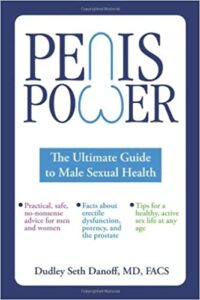Posts Tagged ‘aging’
The Years by Nicholas Delbanco
It isn’t often that I find a novel to recommend to you that portrays characters our age in a way that’s relevant, realistic, and insightful about aging and relationships. As a reader, I want to connect with characters and plot lines that I can relate to at this time of my life (age 71 as I write this) via beautifully crafted fiction.
The Years by Nicholas Delbanco is a splendid example of the kind of book I love to read. It’s literary fiction, not a quick or mindless read. It’s achingly honest about aging.
How did it happen, Lawrence wondered, that the person in the mirror was sprouting liver spots and wrinkles and hair in his nostrils and ears?
You’ll invest some brain power in following the non-chronological sequencing. We meet Lawrence and Hermia when they re-meet in 2004 on a cruise ship after more than 40 years apart. He’s 64; she’s 63. The book flits back and forth from 2004 to their past. We learn how they met and fell in love in college, how they broke up and drifted apart, different relationships that shaped each of them as they journeyed through their lives, and the scars and regrets they carry with them.
They leaned toward each other, pressed against each other, and she wondered what her breasts would feel like if he kissed them as he used to, and what would happen next. She saw them in the mirror, two bent gray heads adjacent in the ornate gilt-framed glass, saw them touching lips and cheeks as though performing for the camera in some sort of time-lapse photograph, a present overlay upon the past.
Yes, we can anticipate that this chance meeting will lead to a renewed love connection, but the book is still not predictable. In the latter half of the book, we move forward through the time after they reconnect. There are surprises, which I won’t reveal, and even the predictable parts are nuanced, never trite.
It’s rare to find a novel that speaks realistically about love and aging and includes sex. The sex scenes are tender, slow to unfold, and not graphic. For example:
They had been passionate together the way the young are passionate, and nothing in her life before had readied her for how they fit together or how she, holding him, felt … That passion was not spent. It was spent in the physical sense, of course; she could no longer manage, and he could not manage, the revels of the young … But it was like The Tempest; it was everything restored, made whole, old treacheries forgiven and old arguments resolved. What had been lost was found. They were gentle together now, slow. It was strange to be so much in love with someone she had loved before and known so well and parted from and then spent more than forty years not knowing….
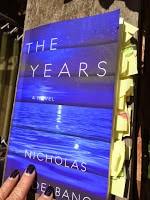 I found the writing masterful. I put post-its throughout my copy to remind me of pages I wanted to return to, and this photo shows what my book looks like now.
I found the writing masterful. I put post-its throughout my copy to remind me of pages I wanted to return to, and this photo shows what my book looks like now.
The Amazon ratings are mixed, and I’d love to know the age breakdown for those who loved and those who were bored by this novel. I suspect that the negative reviews were by younger readers or those who don’t have patience for literary fiction that is slow to unfold. At our age, we know that life is slow to unfold, and we don’t need to rush a book any more than we have to rush sex these days! I can’t imagine readers in their sixties and beyond being unmoved by this novel.
If what I’ve written here intrigues you, I hope you’ll read The Years and post your own comments.
 |
| Nicholas Delbanco, born 1942 |
Transparent and Still Mine: highly recommended
 I’m always hungry for films that portray aging and relationships insightfully, teaching me something new and unexpected.
I’m always hungry for films that portray aging and relationships insightfully, teaching me something new and unexpected.
Amazon Prime jolted me recently with two stellar offerings — one series and one film — that feature aging characters who don’t fit any of the stereotypes. Both affected me profoundly, and I recommend them to you:
Transparent
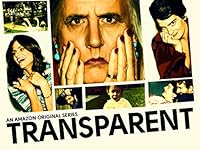 At 68, Mort (played masterfully by Jeffrey Tambor) comes out as a trans woman who wants to be called Maura. In this sweet, smart, and strongly acted ensemble series, we see the strengths and vulnerabilities of Mort/Maura and a family of ex-wife and three adult children — who make a ton of relationship mistakes of their own.
At 68, Mort (played masterfully by Jeffrey Tambor) comes out as a trans woman who wants to be called Maura. In this sweet, smart, and strongly acted ensemble series, we see the strengths and vulnerabilities of Mort/Maura and a family of ex-wife and three adult children — who make a ton of relationship mistakes of their own.
This 10-episode series resolves many questions and leaves enough unanswered to allow for a second season, which is in the works — hurray!
Yes, there’s lots of sex in Transparent, but (boo) only Maura’s children are having it. Maura is more interested in establishing her identity and being accepted by her family than in having sex with anyone — at least in season 1. Will this change in the second season?
Still Mine
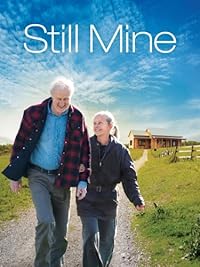 Craig (James Cromwell) is watching Irene (Geneviève Bujold), his wife of 61 years, lose her memory. He loves her fiercely and wants to protect her by building a house that will be easier for her to live in.
Craig (James Cromwell) is watching Irene (Geneviève Bujold), his wife of 61 years, lose her memory. He loves her fiercely and wants to protect her by building a house that will be easier for her to live in.
Although Craig has been building houses his whole life, he’s no match for the bureaucracy that insists on permits and strict adherence to building codes that are irrelevant to Craig (the plans are in his head; the lumber came from a tree he felled; the knowledge came from his father and a lifetime of craftsmanship and self-sufficiency).
The love and chemistry between Craig and Irene are powerful. The tenderness in their loving looks and caresses will make you applaud or cry or both. And rather than portray this elderly couple as sexless, there’s a sexy undressing scene early in the film that includes, “This never gets old. We always did passion well.”
This film is based on real people and actual events. Don’t miss it.
What films have you watched that portrayed aging and relationships in a non-stereotypical way? I look forward to your recommendations.
Penis Power: Interview with Dudley Danoff
Urologist Dudley S. Danoff, MD, FACS, is the author of Penis Power: The Ultimate Guide to Male Sexual Health (Del Monaco Press, 2011). It’s an upbeat and even entertaining guide to the complexities, myths, facts, and vagaries of owning a penis (or, in my case, liking penises and being endlessly fascinated by them). Dr. Danoff covers how they work and what’s going on when they don’t work—psychologically as well as physiologically.
My male readers often write me with age-related questions about their penises: what’s a “normal” change with age vs. what’s a medical problem, how they can deal with erection difficulties, how to negotiate new needs and issues with a partner. “We are tragically ill-informed about the penis,” says Dr. Danoff, and he aims to change that.
Although this book is not specifically aimed at our age group, all of it applies to us, and I guarantee you’ll say, “I didn’t know that” several times as you read, even if you’ve owned a penis for 50, 60, or 70 years.
I invited Dr. Danoff to answer questions that specifically address men age 60+ and the women in their lives. I welcome your comments.
Q: What is your big message to our older men?
A: Sex is good for you. It maintains overall physical strength and cardiovascular health, and most of all, it keeps you invigorated. A man’s penis is there to serve him from puberty to old age.
Q: What are the most common misunderstandings that men age 60+ have about their penises or about their sexuality in general? What do you wish all men knew as they aged?
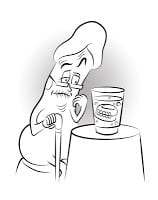 A: By far, the most frequent complaint I hear from men is that they do not have the same level of sexual desire they used to have. It takes longer to get an erection, it takes longer to ejaculate, it takes longer to get aroused again after they make love, and their erections are not as firm. These conditions are all predictable changes that occur as men get older.
A: By far, the most frequent complaint I hear from men is that they do not have the same level of sexual desire they used to have. It takes longer to get an erection, it takes longer to ejaculate, it takes longer to get aroused again after they make love, and their erections are not as firm. These conditions are all predictable changes that occur as men get older.
Attitude is the key to penis longevity. My super-potent patients tell me that sex gives them as much joy at 70 as it did at 20. Some say the sex is even better! Equal pleasure can be obtained from occasional, prolonged intercourse with one orgasm as with frequent, rapid intercourse with multiple orgasms.
All men, as they age, deserve active, healthy sex lives as long as they remain physically fit. Do not expect to do at 60 what you did at 40. Adjust your sexual activities as your body changes, just as you adjust other activities. Look upon the adjustment as both a new challenge and a new opportunity.
As you age, learn to use your mind and imagination to make up in creativity what you may lack in physical strength. As long as you are able to breathe, move your extremities, maintain relative control over your bodily functions, remain alert enough to identify the date and day of the week, and sustain a positive mental outlook, you can continue to exercise your penis power indefinitely.
Q: What would you say to many men age 60+ who tell me that they don’t get good information or direction from their urologists when they report undependable or nonexistent erections? They are commonly told, “Well, you’re older now,” or “It’s ED,” without a medical workup to see whether some underlying condition is causing the ED.
A: Find another urologist who is knowledgeable about erectile dysfunction and is willing and able to thoroughly evaluate you. A comprehensive evaluation, including a full cardiovascular evaluation, by a qualified urologist is essential. Endocrine issues, such as low testosterone or unrecognized diabetes, can then be treated, and erectile dysfunction will improve. Knowledge is power. There are many treatments on the urologic menu for erectile dysfunction, but first you need a proper diagnosis to identify the underlying cause. Treatment is both available and effective in almost all cases and will result in satisfactory erections.
Q: Many men would rather sever their own leg than admit to a doctor that they are experiencing erectile difficulties. Why is it important to see a doctor before self-treating with drugs or other assists?
A: Many serious medical conditions that are first manifested by erectile difficulties go unrecognized. It is absolutely essential to get a full evaluation by a qualified urologist in all cases of erectile dysfunction in order to determine the presence or absence of some serious (or not so serious) medical problem and treat it accordingly. For example, if low serum testosterone is found, testosterone replacement therapy can give spectacular results. Under no circumstances should a man self-treat his erectile dysfunction with over-the-counter preparations without first determining the presence or absence of an underlying medical condition that is correctable.
Q: How can women enhance their partner’s and their own sexual pleasure when erections and intercourse are not the main events?
 A: Most importantly, do not think old! Sexual pleasure is all about attitude. If your mind is strong and your partner’s mind is strong, intimacy and sex without vaginal penetration can be enormously pleasurable. The key is not to lament what you have lost. Be grateful for what you still have and make the most of it. Age is not a deterrent to great sex. Rather, it is a challenge and an opportunity.
A: Most importantly, do not think old! Sexual pleasure is all about attitude. If your mind is strong and your partner’s mind is strong, intimacy and sex without vaginal penetration can be enormously pleasurable. The key is not to lament what you have lost. Be grateful for what you still have and make the most of it. Age is not a deterrent to great sex. Rather, it is a challenge and an opportunity.
If you keep your enthusiasm, you can compensate for or even delay the effects of aging. You do not stop having sex because you are old—you get old because you stop having sex! Talking candidly with your partner about aging is the best way to find a solution for maintaining a healthy sex life.
Q: What else do you want women to understand about their male partners?
A: Older men are just as penocentric as younger men are, even though capacity may be diminished. I would encourage older women to become more “penis oriented.” Older women who are penis oriented have more fun and also have better marriages, more faithful partners, and greater personal fulfillment in all aspects of their lives. If you believe that each partner has the mutual responsibility to satisfy the other’s needs, then it follows that you will hold up your end of the bargain as a woman by making your partner’s penis one of your top priorities.
Being penis oriented does not imply a belittlement of female sexuality. It simply means learning to understand and accommodate an older man’s penis needs by approaching that task with all of the pride and skill that you would bring to any other endeavor. I assure the older woman that if you take the steps to become informed, you and your man will reap rewards you have only dreamed about.
Images are from Penis Power: The Ultimate Guide to Male Sexual Health by Dudley Seth Danoff, MD. ©2011 Dudley Seth Danoff. Reprinted by permission of Dudley Seth Danoff. Copies of the book are available at your local bookstore or may be ordered through Amazon.com.
Staying Sexy in an Aging Body: Joint Pain
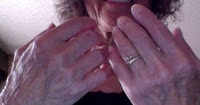 You can’t ignore joint pain — but don’t let it push you into avoiding sex! When sexual positions and activities worsen pain, we can find props and positions that work for us so we feel the pleasure, not the pain. Julie Weingarden Dubin interviewed me about sex and joint pain for Grandparents.com, and the interviewgot me thinking about more tips I’d like to share with you. Here they are.
You can’t ignore joint pain — but don’t let it push you into avoiding sex! When sexual positions and activities worsen pain, we can find props and positions that work for us so we feel the pleasure, not the pain. Julie Weingarden Dubin interviewed me about sex and joint pain for Grandparents.com, and the interviewgot me thinking about more tips I’d like to share with you. Here they are.
What can we do to minimize joint pain before and during sex?
- Schedule sex! Spontaneity is vastly overrated when it comes to sex at our age! We get more pleasure if we plan for it, and that’s true for avoiding joint pain especially. Make a “sex date” in advance, whether you’re newly dating or long-time partners. This way, you can both anticipate it and make time for it, which raises the pleasure and decreases the stress. Turn off the phone ringer, the computer, the gadgets, lock the door, and just enjoy each other.
- Time your anti-inflammatory medication so it kicks in before your “sex date.”
- Get some physical exercise before getting naked. This lubricates the joints and gets you in touch with your physicality. Dance, walk, cycle, do yoga — whatever you like to do.
- Get a supportive sex cushion (no kidding, they exist) to make any position more comfortable. For example, the Wedge by Liberator is terrific for assisting back, hips, knees.
- Have lots of warm-up/ foreplay/ arousal in a comfortable position. This
way you’ll need less time in a less comfortable position when you get to
it.

- Use a sex toy to hasten orgasm, minimizing the time in a less comfortable position or action. For example, if your partner likes manual stimulation (and who doesn’t?), but that hurts your arthritic wrist or hands, use a sex toy to help out. A vibrating cock ring or masturbation sleeve for the man doesn’t require the partner’s wrist. For the woman, try one of the many vibrators that “rests” in the right position with no or minimal effort to hold it in place. I review sex toys from a senior perspective – which includes whether they’re easy on arthritic wrists! – right here on this blog. Look for the label “sex toys” or “vibrator reviews” in the right-hand column.
See these reviews for ideas.
I’ve been asked, “What would recommend as the BEST sex positions for seniors?” I have to answer this way:
There’s nothing that “seniors’ in general will agree on, whether politics, movies, or the best sex position. We’re all individual in finding positions we find comfortable, and maybe your favorite position isn’t comfortable for your partner, or doesn’t do much for you sexually. It’s all a matter of trial and negotiation. Creativity and a lot of laughter help, too!
Do you have any tips for avoiding joint pain during sex? Please comment!

